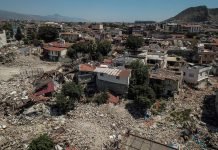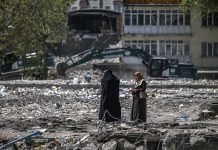Earthquakes that struck southern Turkey in early February have led to less visible but significant psychological consequences for survivors, Médecins Sans Frontières (MSF), also known as Doctors Without Borders, has said.
People continue to be hyper alert and have difficulty concentrating and sleeping, MSF said, adding that some have nightmares every night, are forgetful and have lost their appetite.
A 7.8-magnitude earthquake that struck near the Turkish city of Gaziantep – home to around 2 million people and on the border with Syria – as people were sleeping on February 6 was followed by dozens of aftershocks, including a 7.5-magnitude temblor that jolted the region in the middle of search and rescue efforts the same day.
“Despite the problematic hygiene conditions and sometimes unfavourable weather conditions, most people are still too scared to enter buildings,” said Nazlı Sinem Koytak, a psychologist for İmece İnisiyatifi (Imece Initiative) in Adıyaman, a local NGO supported by MSF. “They don’t feel safe. People stay outdoors out of survival instinct.”
The consequences of the devastating earthquakes will affect people’s lives for years to come, according to MSF.
MSF teams support local organizations in providing psychosocial support to people in affected areas, through Imece Initiative in Adıyaman and Malatya provinces, and the Maya Vakfı (Maya Foundation) in Hatay and Kahramanmaraş.
The International Organization for Migration (IOM) earlier said some key sectors of the emergency and recovery response in Turkey’s quake zone remain dangerously underfunded, including health.
An estimated 500 health care workers died in the earthquakes, hundreds have been injured and thousands left without a place to call home, according to the IM.
Around 2.7 million people remain internally displaced in the country, UNICEF Turkey said.
Shelter, water sanitation facilities, healthcare, protection (including mental health and psychosocial support) and continuity of learning remain priority needs, according to UNICEF Turkey.















